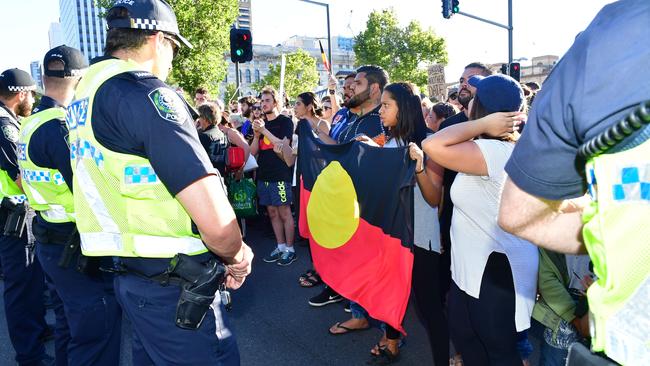It feels like the country is celebrating dispossession and slaughter | Douglas Smith
Australia Day, Invasion Day, Survival Day, whatever you want to call it, is still the most divisive day in the country, writes Douglas Smith.
Opinion
Don't miss out on the headlines from Opinion. Followed categories will be added to My News.
For the first time since I became a journalist nine years ago, I’m not working on January 26.
It hasn’t been good for my mental health.
Every year on that day, I feel an overwhelming sense of anxiety, sadness and exclusion.
The day still offends me, and there are only two places I want to be: Asleep, or with other Indigenous people in large numbers, so I can either reflect quietly on the pain I am feeling or be comforted in the knowledge I am with others who feel the same way.
Australia Day, Invasion Day, Survival Day, whatever you want to call it, is still the most divisive day in the country.
We’ve seen it in the past from both sides, whether it’s the burning of both the Aboriginal or Australian flag, protests in every major city, or politicians using their position to create more division.
How can Australia be serious about reconciliation and celebrate a day that is for good reasons, offensive and of great sadness to Indigenous people?
Personally, it feels like the country is celebrating the dispossession of land and slaughter of Indigenous people. I’m not saying that’s what a majority of the country celebrates the day for, but that’s what it looks and feels like.
This is because I, along with many other Indigenous people, suffer from intergenerational trauma. The impacts of colonisation are still real for me.
My grandfather, who raised me since I was a baby until he died when I was 17, was forcibly removed as a child and split up from his baby sister. They never saw each other again until decades later.
He was a part of the Stolen Generations, which we now know was not for the protection of Indigenous children.

Children who were taken away experienced neglect and abuse, and were denied their language and culture.
This resulted in them being more likely to suffer from depression, mental illness and low self-esteem.
Despite all the good things my grandfather passed on to me before he died, the trauma he experienced was also a part of that.
I’ve heard both arguments of, “get over it”, or, “it was a long time ago”. But the reality is, that it wasn’t that long ago at all.
In the grand scheme of things, Aboriginal and Torres Strait Islander people have lived on and walked this land for at least 60,000 years.
Compare that to the past 234 years since Captain Phillip arrived and planted a flag, and you might have some idea of what my people have lost.
This year, I will take this day to reflect on what has actually taken place in this country, and mourn my grandfather, along with my ancestors.
As a reporter, I’ve covered the day in three different states and the message is still clear from the Indigenous community: Either change the date or abolish the day altogether.
I don’t agree with the latter, but a date change is more my feeling towards it.





